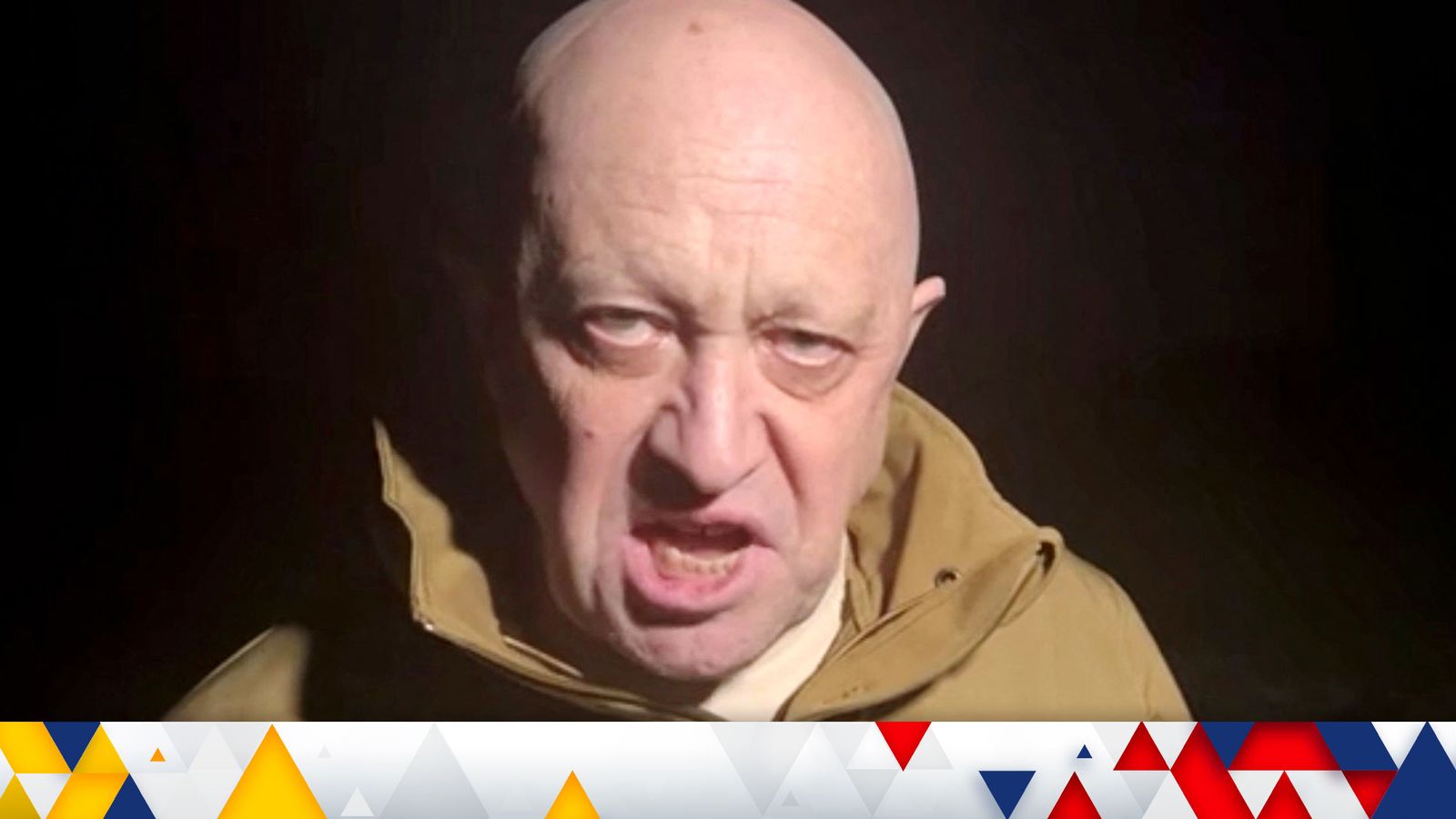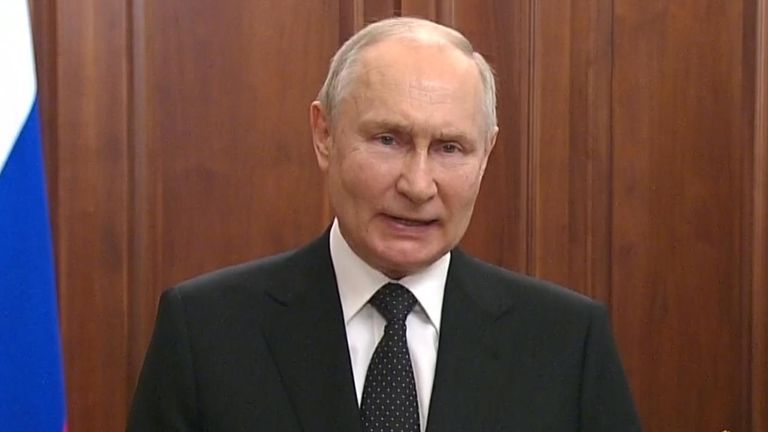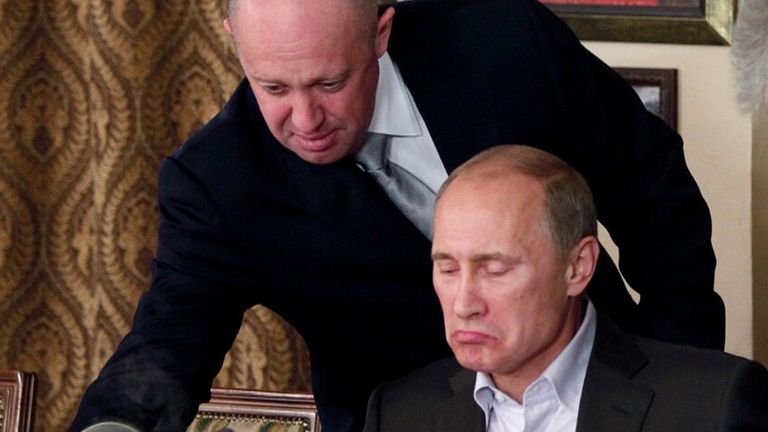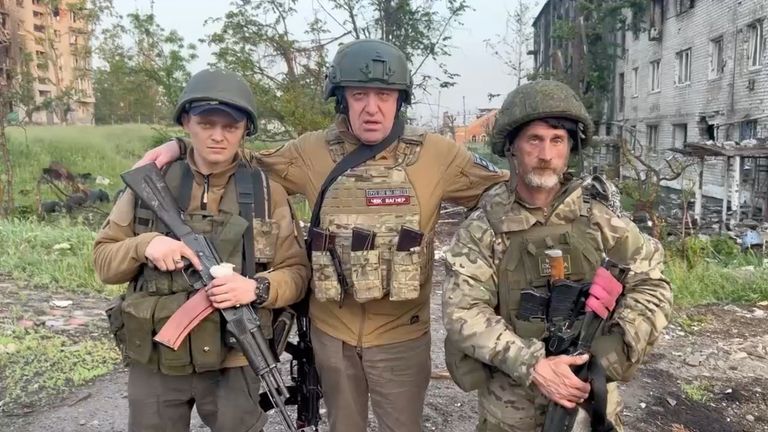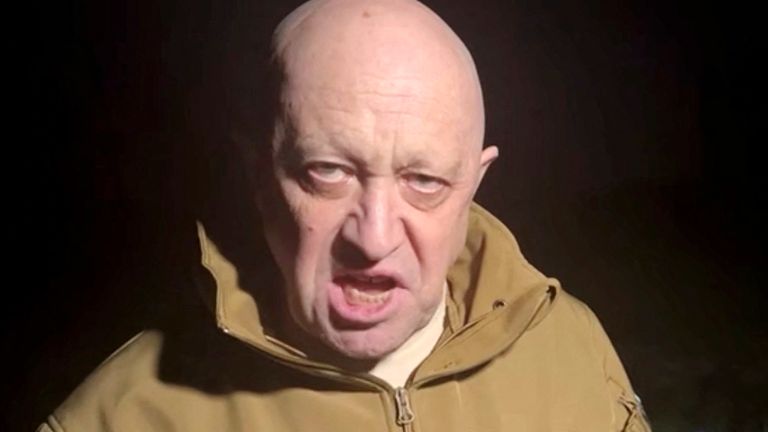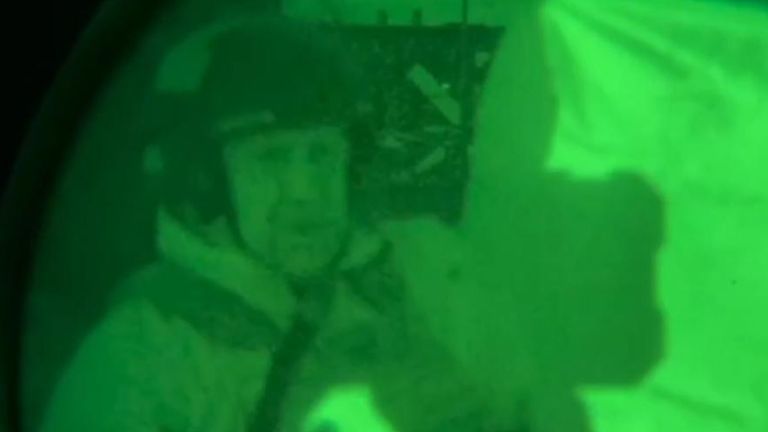From flea market hot dog seller to the head of a mercenary group behind a “mutiny” against the Russian military, Yevgeny Prigozhin’s rise has been far from ordinary.
A former convict who spent much of his young life behind bars, he rose up to become close to Vladimir Putin.
He even earned himself the nickname “Putin’s chef” on account of his Kremlin-linked catering business.
Wagner troops seize city 300 miles from Moscow – Ukraine war latest
But the 62-year-old boss of the mercenary Wagner Group now stands accused of open rebellion against Russia by his close friend.
It is a situation some experts say has been a long time coming, particularly in light of Prigozhin’s incendiary remarks about Russia’s military leadership and his previous warning of a 1917-style rebellion.
But who is Prigozhin and how did we get to this point?
Crime and hot dogs
Born in 1961 in the city of Leningrad – now Saint Petersburg, Prigozhin had a difficult start in life, losing his father at a young age.
He turned to crime in his teenage years, initially theft, but quickly escalating into more serious crimes. He was jailed for 12 years, aged 20, in 1981 after being convicted of robbery and fraud.
“Prigozhin is a former conman – he was a thug,” according to Samantha de Bendern from the Royal Institute of International Affairs.
“He was put in prison in the 1980s for basically assaulting a woman in the street. He spent quite a number of years in the Soviet Union’s penitentiary system,” she told Sky News.
Prigozhin was pardoned in 1988 and released in 1990, when he began selling hot dogs at a flea market in Leningrad with his mother and stepfather.
He left prison during perestroika and glasnost – the period in the 1990s when Russia was opening up to the world after years of isolation under communism.
‘Putin’s butcher’ and joining the elite
Prigozhin later founded, or become involved in, many new businesses and in the 2000s, he grew closer to Putin.
“He very quickly got onto the private property/private enterprise bandwagon and ended up being a hot dog seller,” Ms de Bendern told Sky News.
“And this is where things become very mysterious because he transformed himself from hot dog seller to restaurateur to the grand and great of the new post-Soviet Russian elite.”
According to a New York Times article in 2018, Prigozhin said the “rubles were piling up faster than his mother could count them”.
His companies won lucrative government contracts, including providing school lunches, and in Moscow alone his company Concord won millions of dollars in deals.
Prigozhin eventually became the caterer to a number of Russian state concerns, including the army – a deal which jailed Putin critic Alexei Navalny claimed broke competition bidding rules.
He was also catered for a lot of state visits and met presidents and heads of state – including then-French president Jacques Chirac, who dined with Putin at one of his restaurants.
His catering background and his work for the Kremlin earned Prigozhin the nickname “Putin’s chef” – or sometimes “Putin’s butcher”.
Prigozhin addressed the nickname earlier this year and denied he was ever a chef, saying “butcher” was more accurate.
“They could have just given me a nickname right away – Putin’s butcher, and everything would have been fine,” he said.
Coming out as Wagner leader
A once shadowy private military contractor (PMC), little was known about the Wagner Group’s formation and Prigozhin’s role was kept a closely guarded secret.
Experts believe it was likely set up to allow plausible deniability about Russia’s military involvement in Ukraine and Syria.
It is privately owned but its management and operations are “deeply intertwined” with the Russian military and intelligence community, according to the Center for Strategic and International Studies (CSIS), an American think tank.
The Russian government has previously denied involvement with the group and has insisted private military contractors are not legal in Russia.
However, Putin recently praised Wagner’s capture of Bakhmut in what’s believed to be his first acknowledgment of the group.
The group came to the world’s attention in 2014 during the Donbas conflict, where it supported pro-Russian separatists in a coup, and for sneak attacks, reconnaissance and intelligence-gathering during the annexation of Crimea.
Read more:
Prigozhin a disaster waiting to happen – analysis
Putin accuses mercenary boss of treason
Wagner is also believed to have operated in countries in Africa – including Mali, Mozambique and Sudan – where it has been accused of human rights abuses by the EU.
Prigozhin previously denied any links to Wagner and even launched legal action against Western journalists who attempted to draw such a connection.
However, after Russia’s February 2022 invasion of Ukraine, Prigozhin went public and claimed he had founded the mercenary force in 2014.
Recruiting thousands of prisoners
Prigozhin’s influence has grown since the invasion and his forces have stepped out of the shadows to be used openly in combat.
In late March 2022, UK defence intelligence and US officials said Wagner Group had about 1,000 personnel in Donbas and eastern Ukraine.
Click to subscribe to the Sky News Daily wherever you get your podcasts
Then, in August, posters calling for recruits to join Wagner began to appear in Russian cities; while a month later, a video appeared which showed Prigozhin attempting to recruit prisoners.
By December, Wagner forces had swelled to 50,000, according to John Kirby, the coordinator for strategic communications at the White House’s National Security Council.
Around 40,000 were believed to be convicts and the rest contractors, he added.
“Wagner almost certainly now commands 50,000 fighters in Ukraine,” the UK’s Ministry of Defence said in January this year.
Despite huge casualty rates, it has proved effective at delivering battlefield success – something the Russian army has struggled with.
Prigozhin’s forces were heavily involved in the capture of Bakhmut, one of the war’s bloodiest battles.
According to US figures, around 20,000 Russian troops were killed in the fighting, with around half thought to be from the Wagner Group.
While Prigozin has appeared to show compassion for the life of his mercenaries at times, he infamously appeared to revel in the brutal execution of a Wagner deserter with a sledgehammer.
“A dog receives a dog’s death,” said Prigozhin in response to the video, published in November last year.
‘Eat their guts in hell’ – Clashes with the Kremlin
While Wagner forces have made advances, the war has also given Prigozhin a chance to further his own political ambitions.
He has, on several occasions, made public his displeasure with the Russian military leadership, often in strongly-worded videos on social media.
Earlier this year, he accused the defence ministry of failing to provide enough ammunition to Wagner forces in Bakhmut and not providing cover for their flanks.
He even threatened to pull troops out if they were not resupplied.
“These are someone’s fathers and someone’s sons,” Prigozhin said at the time, as he shared a video of himself standing by the bodies of dead troops.
“The scum that doesn’t give us ammunition will eat their guts in hell.”
Earlier this month, Prigozhin arrived in Moscow with a contract which, in effect, attempted to formalise Wagner as an equivalent but separate military force to the Russian army.
Hours before his rebellion, he took aim at defence minister Shoigu – often the main target of his vitriol – as well as chief of the general staff Valery Gerasimov.
He also claimed Kremlin officials and oligarchs wanted the invasion of Ukraine to make money and advance their own careers.
Prigozhin has often taken swipes at the Russian “elite”, who he claims have avoided the impact of the war while reaping the benefits.
In May, he warned the country would face turmoil if ordinary Russians continued getting their children back in coffins while those of the elite “shook their a***s” in the sun.
He also released a video in which he paid respect to foreign fighters who had fallen while fighting for Ukraine in Bakhmut by draping their coffins with their country’s flag – which some experts said was a ploy to boost his position among world leaders.
However, while critical of Kremlin officials, one thing Prigozhin has been careful to avoid is criticism of Putin himself.
“He is a product of the Kremlin,” said Andrei Kolesnikov of the Carnegie Russia Eurasia Centre.
“He can be against part of the elite but at the same time, if he were against Putin, he would disappear overnight.”
Mark Galeotti of University College London, who specialises in Russian security affairs, said during his podcast In Moscow’s Shadows: “[Prigozhin] is not one of Putin’s close figures or a confidant.
“Prigozhin does what the Kremlin wants, and does very well for himself in the process. But that’s the thing – he is part of the staff, rather than part of the family.”
